小学英语新版-牛津译林版六年级下册 Unit1-2 复习课件(共42张PPT)
文档属性
| 名称 | 小学英语新版-牛津译林版六年级下册 Unit1-2 复习课件(共42张PPT) | 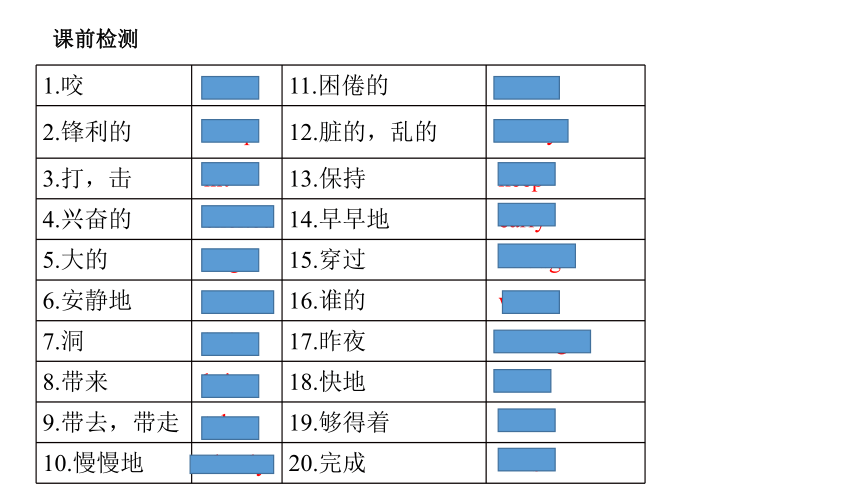 | |
| 格式 | pptx | ||
| 文件大小 | 1.7MB | ||
| 资源类型 | 教案 | ||
| 版本资源 | 牛津译林版 | ||
| 科目 | 英语 | ||
| 更新时间 | 2021-03-25 09:11:42 | ||
图片预览

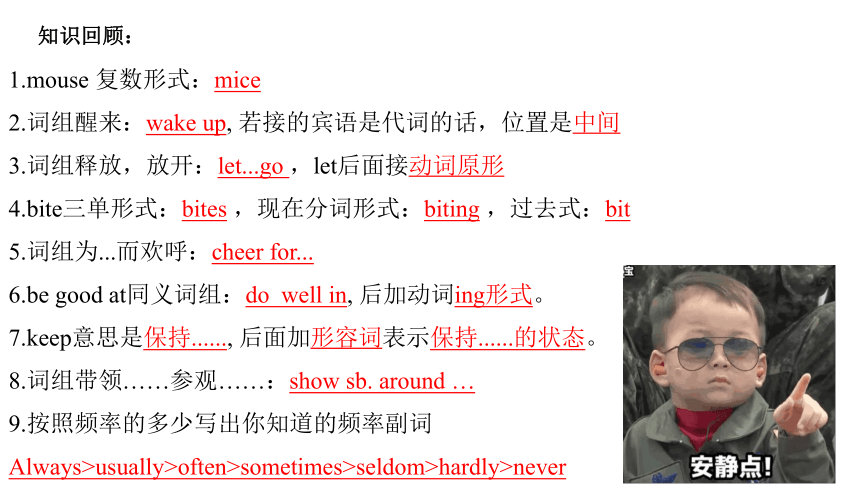
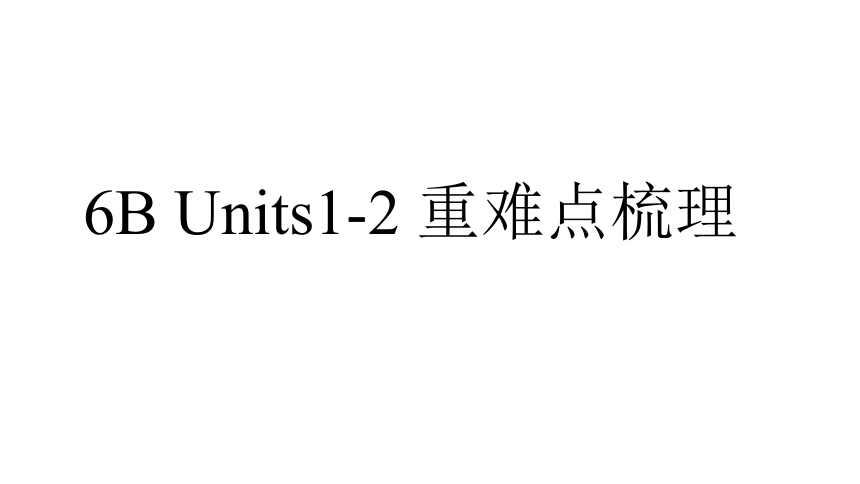
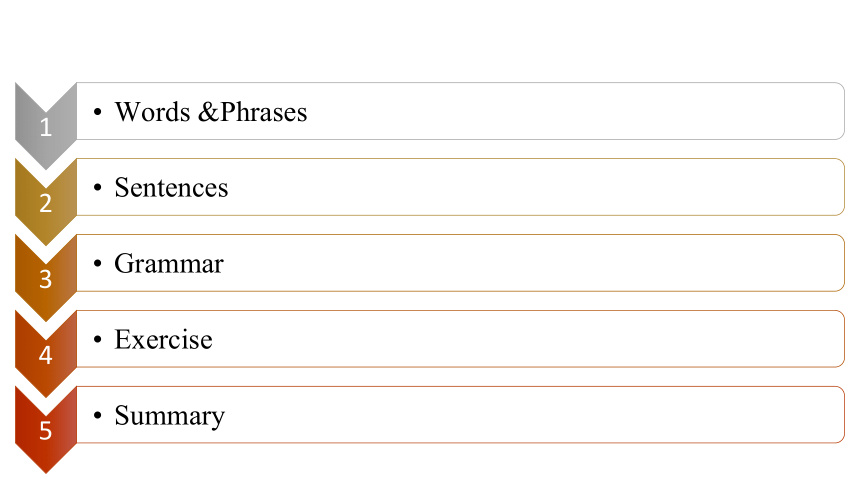
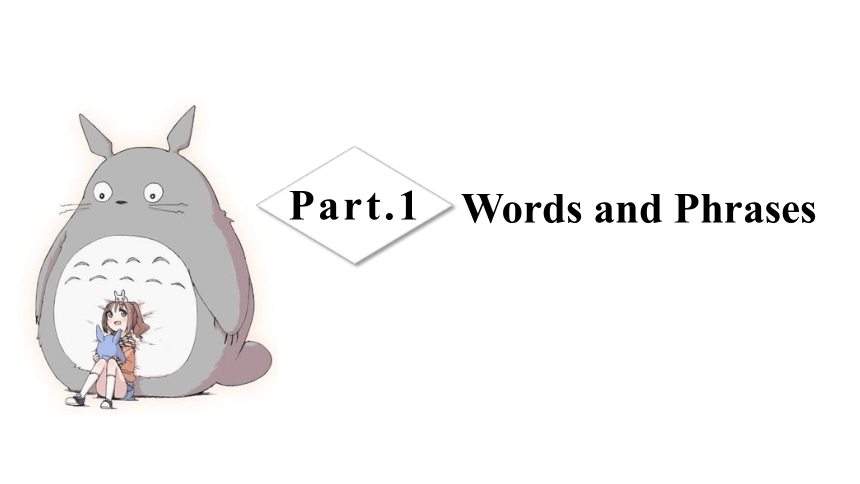
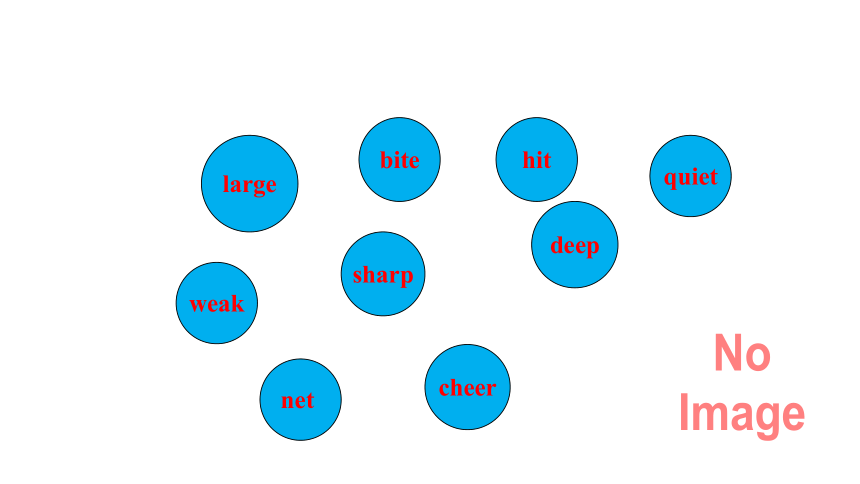
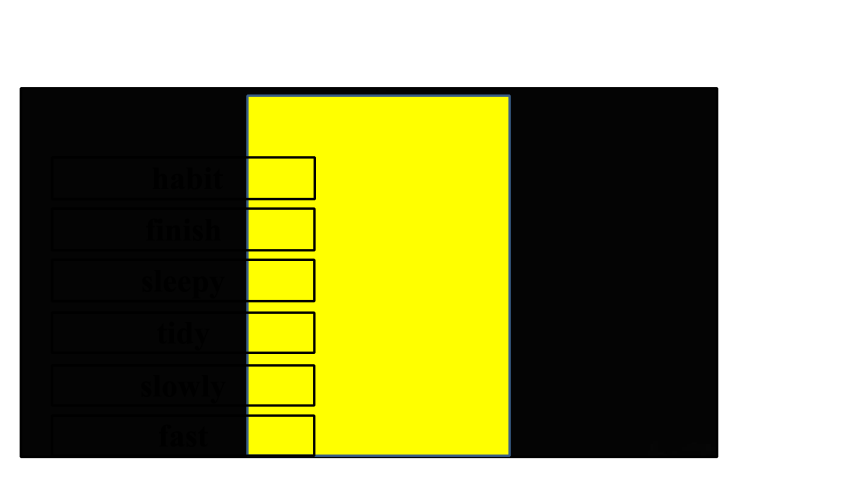
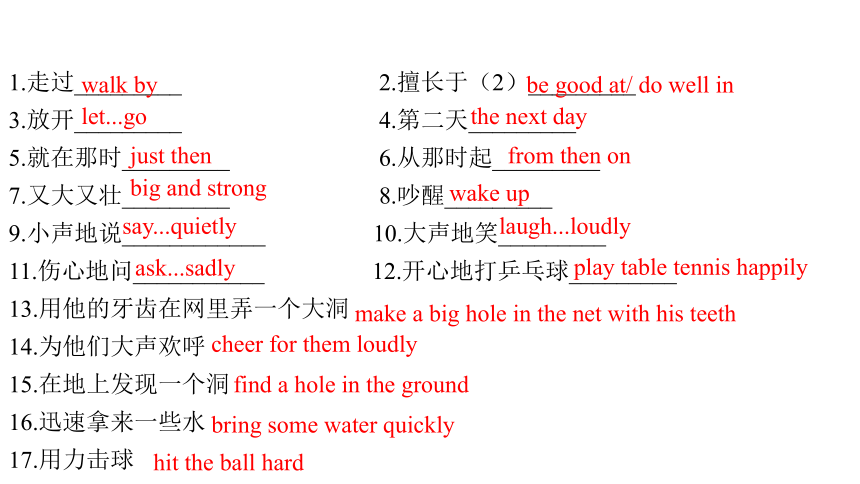
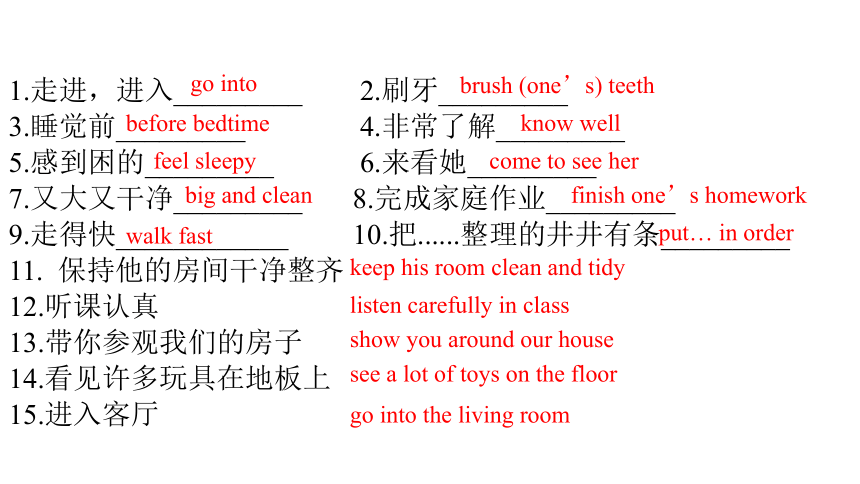
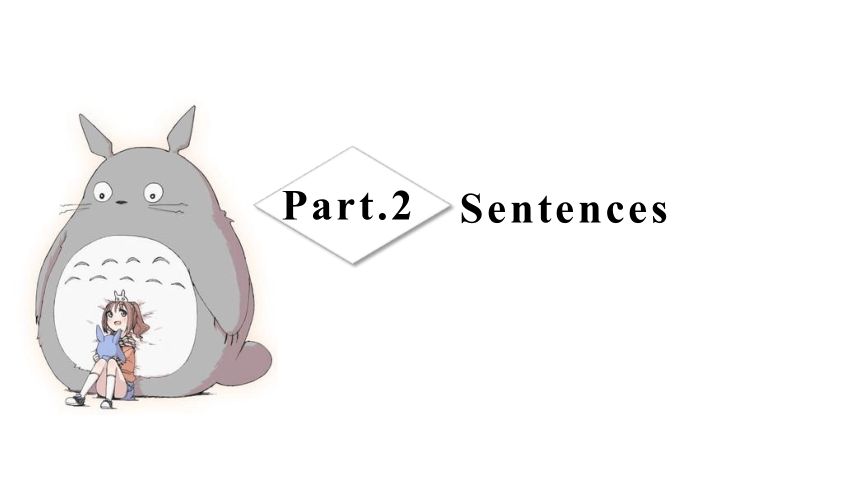
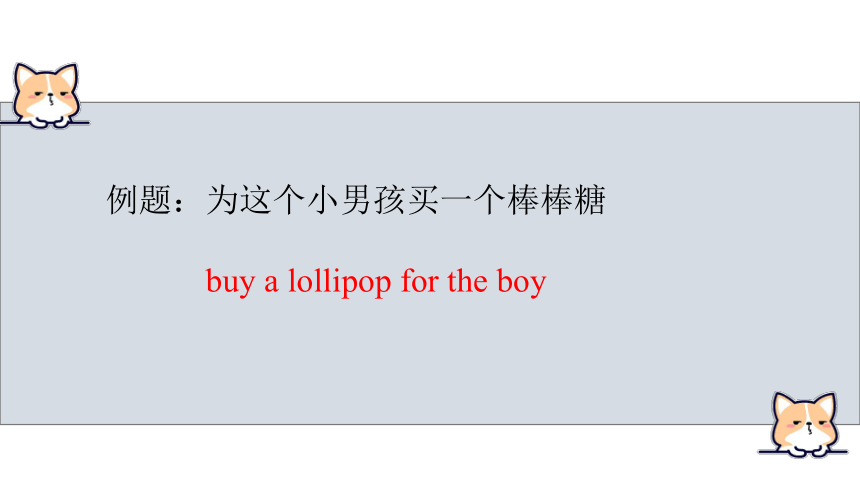
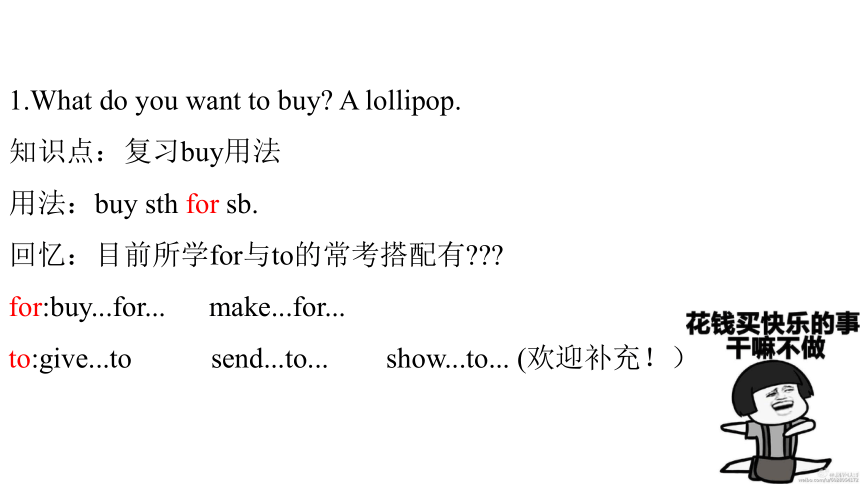
文档简介
(共42张PPT)
进门考(每空5
分)
1.咬
bite
11.困倦的
sleepy
2.锋利的
sharp
12.脏的,乱的
messy
3.打,击
hit
13.保持
keep
4.兴奋的
excited
14.早早地
early
5.大的
large
15.穿过
through
6.安静地
quietly
16.谁的
whose
7.洞
hole
17.昨夜
last
night
8.带来
bring
18.快地
fast
9.带去,带走
take
19.够得着
reach
10.慢慢地
slowly
20.完成
finish
课前检测
旧知回顾
1.mouse
复数形式:mice
2.词组醒来:wake
up,
若接的宾语是代词的话,位置是中间
3.词组释放,放开:let...go
,let后面接动词原形
4.bite三单形式:bites
,现在分词形式:biting
,过去式:bit
5.词组为...而欢呼:cheer
for...
6.be
good
at同义词组:do
well
in,
后加动词ing形式。
7.keep意思是保持......,
后面加形容词表示保持......的状态。
8.词组带领……参观……:show
sb.
around
…
9.按照频率的多少写出你知道的频率副词
Always>usually>often>sometimes>seldom>hardly>never
知识回顾:
6B
Units1-2
重难点梳理
Presentation
Part.1
Words
and
Phrases
快速读出你看到的单词
deep
hit
large
net
quiet
bite
cheer
sharp
weak
slowly
sleepy
tidy
habit
finish
fast
快速读出你看到的单词
词组复习Unit1:
1.走过_________
2.擅长于(2)_________
3.放开_________
4.第二天_________
5.就在那时_________
6.从那时起_________
7.又大又壮_________
8.吵醒_________
9.小声地说____________
10.大声地笑_________
11.伤心地问___________
12.开心地打乒乓球_________
13.用他的牙齿在网里弄一个大洞
14.为他们大声欢呼
15.在地上发现一个洞
16.迅速拿来一些水
17.用力击球
walk
by
be
good
at/
do
well
in
let...go
the
next
day
just
then
from
then
on
big
and
strong
wake
up
say...quietly
laugh...loudly
ask...sadly
play
table
tennis
happily
make
a
big
hole
in
the
net
with
his
teeth
cheer
for
them
loudly
find
a
hole
in
the
ground
bring
some
water
quickly
hit
the
ball
hard
词组复习Unit2:
1.走进,进入_________
2.刷牙_________
3.睡觉前_________
4.非常了解_________
5.感到困的_________
6.来看她_________
7.又大又干净_________
8.完成家庭作业_________
9.走得快____________
10.把......整理的井井有条_________
11.
保持他的房间干净整齐
12.听课认真
13.带你参观我们的房子
14.看见许多玩具在地板上
15.进入客厅
go
into
brush
(one’s)
teeth
before
bedtime
know
well
feel
sleepy
come
to
see
her
show
you
around
our
house
go
into
the
living
room
big
and
clean
see
a
lot
of
toys
on
the
floor
keep
his
room
clean
and
tidy
listen
carefully
in
class
put…
in
order
finish
one’s
homework
walk
fast
Part.2
Sentences
例题:为这个小男孩买一个棒棒糖
buy
a
lollipop
for
the
boy
句型讲解
1.What
do
you
want
to
buy?
A
lollipop.
知识点:复习buy用法
用法:buy
sth
for
sb.
回忆:目前所学for与to的常考搭配有???
for:buy...for...
make...for...
to:give...to
send...to...
show...to...
(欢迎补充!)
例题:他真的擅长打篮球。
He
is
really
good
at
basketball.
=
He
is
really
good
at
playing
basketball.
=
He
really
does
well
in
playing
basketball.
2.You
are
really
good
at
table
tennis,
Sam.
知识点:复习be
good
at用法
用法:be
good
at
(doing)
sth=
do
well
in(doing)sth
注意:really的位置?
really放在be动词之后,行为动词之前。(回忆副词的位置)
句型讲解
例题:认真学习
study
hard
这张床太硬了。
The
bed
is
too
hard.
3.
Sam
is
too
excited
and
he
hits
the
ball
hard.
知识点:hard用法
用法:在这句句子中,hard修饰hit,是一个副词,意为“用力地”,同时hard是一个形容词副词同形的词,作形容词时,hard意为“难的;坚硬的”。
句型讲解
例题:他带这个小男孩去了公园。
He
took
the
little
boy
to
the
park.
把午饭带到公园来
bring
lunch
to
the
park
4.
Dad
took
him
to
an
office
in
the
shopping
centre.
知识点:take
sb./sth.
to
sp.
意为“把某人/某物带去某地”
辨析:
bring
sth/sb.
to
sp.
意为“把某人带来某地”
句型讲解
例题:在家听他父母的话
listen
to
his
parents
at
home
我的父母很了解我。
My
parents
know
me
well.
5.
He
listens
to
his
teacher
at
school.
知识点:listen
to
sb.
听某人的话
6.
Wang
Bing
knows
Liu
Tao
well.
知识点:know
sb.
well很了解某人
句型讲解
例题:他总是按时回家。
He
always
goes
home
on
time.
她从不准时上班。
She
never
goes
to
work
on
time.
7.
I
always
have
breakfast
on
time.
知识点:on
time用法
用法:on
time意为“准时;按时”
句型讲解
例题:
把你的新自行车给我看看。
Please
show
me
your
new
bike.
带我父母参观学校
show
my
parents
around
my
school
句型讲解
8.
Let
me
show
you
around
our
house.
知识点:show用法
用法:作动词
show
sb.
around
带…参观
show
sb.
sth
=
show
sth
to
sb.
作名词
a
parrot
show
Part.3
Grammar
例题:1.?All?the?books?_____?(be)?not?here,?but?they?_____?(be)?here??a?moment?ago.?
2.?It?______?(be)?there?just?now,?but?it?isn’t?there?now.?
3.Where?____(?be?)?the?diary?now??It?_____?(is)?there?just?now.?
are
were
was
is
was
1.?There?be?句型的一般过去式
e.g.There?was?a?lion?in?the?forest.?There?was?a?king.?
自主归纳结构???
There
be句型
例题:
1.?My?mother___________(is)?born?in?1960.?
2.?The?lion?___________(bite)?the?net?two?days?ago.?
3.?He?___________(make)?a?big?hole?last?week.?
4.?The?cat?__________(catch)?a?mouse?yesterday.?
5.?Did?you___________(learn)?English?at?school?
6.?They?didn’t__________(go)?go?the?zoo?an?hour?ago.?
was
bit
made
caught
learn
go
2.一般过去时态定义?
?表示在过去某个时间发生的动作、情况或存在的状态,也表示过去经常或反复发生的动作。
注意:行为动词(即实义动词)的过去式没有人称和数的变化!)???????
结构:主语+动词过去式+过去时间状语?
e.g.He?liked?collecting?stamps?a?few?years?ago.???
一般过去时
3.形容词与副词的定义?
形容词:我们把用来修饰名词、代词的词称为形容词。形容词主要描述人或者事物的性质、特征和状态。
e.g.
a?nice?watch??一只漂亮的手表??????????
a?blue?car??一辆蓝色的小汽车??
These?flowers?are?blue.??这些花是蓝色的
???????
The?book?is?very?good.?
形容词副词
副词:说明事情发生的时间、地点、原因、方式、等含义的词,我们称之为副词。多用来修饰动词或整个句子。?
e.g.They?live?happily.?(happily快乐地,幸福地,修饰动词live)?
?
He?runs?fast.???
?
She?came?here?quite?early.??????
?形容词+ly=?副词????
???????
形容词副词
回忆形容词变副词的规则:??
1.一般情况下直接加“ly”,如quick---quickly?
2.以“y”结尾的,先将“y”改成“i”,再加“ly”,如happy---happily???
3.少数以e结尾的形容词,要去掉e再加-ly。如:true-truly等。??
4.但大多数以e结尾的形容词仍然直接加-ly。如:polite-politely等。???
形容词副词
???
形容词变副词通常是加ly,其变化有规律可循。
请记住以下口诀:??
一般直接加,
“元e”去e加,
“辅y”改i加,
“le”结尾e改y。??
形容词副词
1.There
be句型的一般过去式
2.一般过去时
3.形容词副词
活学活用
用所给词的适当形式填空
例:The?story?is?really?(real)?funny.??
这故事真好笑。?
1.?It?usually
rains__________?
(heavy)?in
spring.?
2.?A?young?girl?is?crying?__________
?(loud)?there.?
3.?Jane?jumped__________?
?(high)?to
get
the
book.?
4.?We?can’t?hear?you.?You?have?to?speak?__________?(loud).
heavily
loudly
high
loudly
Part.4
Exercise
Exercise
单项选择
1.
From
then
on,
Sam
and
Tina_________
good
friends.
A.
become
B.
becomes
C.
became
2.
Wang
Fang
is
running__________
in
the
playground.
He
likes________.
A.
fast;
run
B.
fastly;
running
C.
fast;
running
3.
Does
Tom
learn
English_____?
Yes,
he
often
___English
book
after
dinner.
A.
good;
reads
B.
well;
reads
C.
well;
looks
4.
The
lion
cried_________.
________can
I
get
out?
A.
sadly;
What
B.
sadly;
How
C.
sad;
How
5.This
is
my
new
house.
Let
me
________you
________
it.
A.
show;
around
B.
show;
to
C.
show;
for
C
C
B
B
A
Exercise
6.On
my
birthday,
my
friend
_________me
an
book.
I
was
very________.
A.
gave;
exciting
B.
give;
excited
C.
gave;
excited
7.
Don’t
go
to
bed
too
________at
night.
You’re
always
late
_______school.
A.
late;
for
B.
late;
to
C.
early;
for
8.
One
day,
the
men
________the
tiger
________a
big
net.
A.
catch;
with
B.
caught;
with
C.
caught;
in
9.
You________
so
tired.
Do
you
feel________?
A.
looked;
sleepy
B.
looks;
sleepy
C.
look;
sleepy
10.
The
students
cheer
_________them________.
A.
at;
loudly
B.
for;
loudly
C.
for;
loud
C
A
B
C
B
Exercise
用所给动词的适当形式填空
1.
I
can
sing
the
song___________(beautiful).Can
you?
2.
The
cat________
(bite)
the
little
boy
yesterday
morning.
He
cried________
(sad).
3.
The
students
are________
(cheer)
very________(excited).
4.
How
about________
(watch)
the
running
race?
5.
My
father
________
(go)
for
a
walk
every
morning.
6.
Don’t
speak_______
(loud)
in
class,
please.
7.
Don’t________
(laugh)
loudly,
the
baby
is
sleeping.
8.
I
could
not________
(find)
my
book.
beautifluly
bit
sadly
cheering
excitedly
watching
goes
loudly
laugh
find
Part.5
Summary
1.buy
sth
for
sb.
2.be
good
at
(doing)
sth=
do
well
in(doing)sth
3.hard作副词,意为“用力地”;同时hard是一个形容词副词同形的词,作形容词时,hard意为“难的;坚硬的”。
4.take
sb./sth.
to
sp.意为“把某人/某物带去某地”
bring
sth/sb.
to
sp.意为“把某人带来某地”
5.listen
to
sb.
听某人的话
6.know
sb.
well很了解某人
7.on
time意为“准时;按时”
8.show作动词
show
sb.
around
带…参观
show
sb.
sth
=
show
sth
to
sb.
作名词
a
parrot
show
进门考(每空5
分)
1.咬
bite
11.困倦的
sleepy
2.锋利的
sharp
12.脏的,乱的
messy
3.打,击
hit
13.保持
keep
4.兴奋的
excited
14.早早地
early
5.大的
large
15.穿过
through
6.安静地
quietly
16.谁的
whose
7.洞
hole
17.昨夜
last
night
8.带来
bring
18.快地
fast
9.带去,带走
take
19.够得着
reach
10.慢慢地
slowly
20.完成
finish
课前检测
旧知回顾
1.mouse
复数形式:mice
2.词组醒来:wake
up,
若接的宾语是代词的话,位置是中间
3.词组释放,放开:let...go
,let后面接动词原形
4.bite三单形式:bites
,现在分词形式:biting
,过去式:bit
5.词组为...而欢呼:cheer
for...
6.be
good
at同义词组:do
well
in,
后加动词ing形式。
7.keep意思是保持......,
后面加形容词表示保持......的状态。
8.词组带领……参观……:show
sb.
around
…
9.按照频率的多少写出你知道的频率副词
Always>usually>often>sometimes>seldom>hardly>never
知识回顾:
6B
Units1-2
重难点梳理
Presentation
Part.1
Words
and
Phrases
快速读出你看到的单词
deep
hit
large
net
quiet
bite
cheer
sharp
weak
slowly
sleepy
tidy
habit
finish
fast
快速读出你看到的单词
词组复习Unit1:
1.走过_________
2.擅长于(2)_________
3.放开_________
4.第二天_________
5.就在那时_________
6.从那时起_________
7.又大又壮_________
8.吵醒_________
9.小声地说____________
10.大声地笑_________
11.伤心地问___________
12.开心地打乒乓球_________
13.用他的牙齿在网里弄一个大洞
14.为他们大声欢呼
15.在地上发现一个洞
16.迅速拿来一些水
17.用力击球
walk
by
be
good
at/
do
well
in
let...go
the
next
day
just
then
from
then
on
big
and
strong
wake
up
say...quietly
laugh...loudly
ask...sadly
play
table
tennis
happily
make
a
big
hole
in
the
net
with
his
teeth
cheer
for
them
loudly
find
a
hole
in
the
ground
bring
some
water
quickly
hit
the
ball
hard
词组复习Unit2:
1.走进,进入_________
2.刷牙_________
3.睡觉前_________
4.非常了解_________
5.感到困的_________
6.来看她_________
7.又大又干净_________
8.完成家庭作业_________
9.走得快____________
10.把......整理的井井有条_________
11.
保持他的房间干净整齐
12.听课认真
13.带你参观我们的房子
14.看见许多玩具在地板上
15.进入客厅
go
into
brush
(one’s)
teeth
before
bedtime
know
well
feel
sleepy
come
to
see
her
show
you
around
our
house
go
into
the
living
room
big
and
clean
see
a
lot
of
toys
on
the
floor
keep
his
room
clean
and
tidy
listen
carefully
in
class
put…
in
order
finish
one’s
homework
walk
fast
Part.2
Sentences
例题:为这个小男孩买一个棒棒糖
buy
a
lollipop
for
the
boy
句型讲解
1.What
do
you
want
to
buy?
A
lollipop.
知识点:复习buy用法
用法:buy
sth
for
sb.
回忆:目前所学for与to的常考搭配有???
for:buy...for...
make...for...
to:give...to
send...to...
show...to...
(欢迎补充!)
例题:他真的擅长打篮球。
He
is
really
good
at
basketball.
=
He
is
really
good
at
playing
basketball.
=
He
really
does
well
in
playing
basketball.
2.You
are
really
good
at
table
tennis,
Sam.
知识点:复习be
good
at用法
用法:be
good
at
(doing)
sth=
do
well
in(doing)sth
注意:really的位置?
really放在be动词之后,行为动词之前。(回忆副词的位置)
句型讲解
例题:认真学习
study
hard
这张床太硬了。
The
bed
is
too
hard.
3.
Sam
is
too
excited
and
he
hits
the
ball
hard.
知识点:hard用法
用法:在这句句子中,hard修饰hit,是一个副词,意为“用力地”,同时hard是一个形容词副词同形的词,作形容词时,hard意为“难的;坚硬的”。
句型讲解
例题:他带这个小男孩去了公园。
He
took
the
little
boy
to
the
park.
把午饭带到公园来
bring
lunch
to
the
park
4.
Dad
took
him
to
an
office
in
the
shopping
centre.
知识点:take
sb./sth.
to
sp.
意为“把某人/某物带去某地”
辨析:
bring
sth/sb.
to
sp.
意为“把某人带来某地”
句型讲解
例题:在家听他父母的话
listen
to
his
parents
at
home
我的父母很了解我。
My
parents
know
me
well.
5.
He
listens
to
his
teacher
at
school.
知识点:listen
to
sb.
听某人的话
6.
Wang
Bing
knows
Liu
Tao
well.
知识点:know
sb.
well很了解某人
句型讲解
例题:他总是按时回家。
He
always
goes
home
on
time.
她从不准时上班。
She
never
goes
to
work
on
time.
7.
I
always
have
breakfast
on
time.
知识点:on
time用法
用法:on
time意为“准时;按时”
句型讲解
例题:
把你的新自行车给我看看。
Please
show
me
your
new
bike.
带我父母参观学校
show
my
parents
around
my
school
句型讲解
8.
Let
me
show
you
around
our
house.
知识点:show用法
用法:作动词
show
sb.
around
带…参观
show
sb.
sth
=
show
sth
to
sb.
作名词
a
parrot
show
Part.3
Grammar
例题:1.?All?the?books?_____?(be)?not?here,?but?they?_____?(be)?here??a?moment?ago.?
2.?It?______?(be)?there?just?now,?but?it?isn’t?there?now.?
3.Where?____(?be?)?the?diary?now??It?_____?(is)?there?just?now.?
are
were
was
is
was
1.?There?be?句型的一般过去式
e.g.There?was?a?lion?in?the?forest.?There?was?a?king.?
自主归纳结构???
There
be句型
例题:
1.?My?mother___________(is)?born?in?1960.?
2.?The?lion?___________(bite)?the?net?two?days?ago.?
3.?He?___________(make)?a?big?hole?last?week.?
4.?The?cat?__________(catch)?a?mouse?yesterday.?
5.?Did?you___________(learn)?English?at?school?
6.?They?didn’t__________(go)?go?the?zoo?an?hour?ago.?
was
bit
made
caught
learn
go
2.一般过去时态定义?
?表示在过去某个时间发生的动作、情况或存在的状态,也表示过去经常或反复发生的动作。
注意:行为动词(即实义动词)的过去式没有人称和数的变化!)???????
结构:主语+动词过去式+过去时间状语?
e.g.He?liked?collecting?stamps?a?few?years?ago.???
一般过去时
3.形容词与副词的定义?
形容词:我们把用来修饰名词、代词的词称为形容词。形容词主要描述人或者事物的性质、特征和状态。
e.g.
a?nice?watch??一只漂亮的手表??????????
a?blue?car??一辆蓝色的小汽车??
These?flowers?are?blue.??这些花是蓝色的
???????
The?book?is?very?good.?
形容词副词
副词:说明事情发生的时间、地点、原因、方式、等含义的词,我们称之为副词。多用来修饰动词或整个句子。?
e.g.They?live?happily.?(happily快乐地,幸福地,修饰动词live)?
?
He?runs?fast.???
?
She?came?here?quite?early.??????
?形容词+ly=?副词????
???????
形容词副词
回忆形容词变副词的规则:??
1.一般情况下直接加“ly”,如quick---quickly?
2.以“y”结尾的,先将“y”改成“i”,再加“ly”,如happy---happily???
3.少数以e结尾的形容词,要去掉e再加-ly。如:true-truly等。??
4.但大多数以e结尾的形容词仍然直接加-ly。如:polite-politely等。???
形容词副词
???
形容词变副词通常是加ly,其变化有规律可循。
请记住以下口诀:??
一般直接加,
“元e”去e加,
“辅y”改i加,
“le”结尾e改y。??
形容词副词
1.There
be句型的一般过去式
2.一般过去时
3.形容词副词
活学活用
用所给词的适当形式填空
例:The?story?is?really?(real)?funny.??
这故事真好笑。?
1.?It?usually
rains__________?
(heavy)?in
spring.?
2.?A?young?girl?is?crying?__________
?(loud)?there.?
3.?Jane?jumped__________?
?(high)?to
get
the
book.?
4.?We?can’t?hear?you.?You?have?to?speak?__________?(loud).
heavily
loudly
high
loudly
Part.4
Exercise
Exercise
单项选择
1.
From
then
on,
Sam
and
Tina_________
good
friends.
A.
become
B.
becomes
C.
became
2.
Wang
Fang
is
running__________
in
the
playground.
He
likes________.
A.
fast;
run
B.
fastly;
running
C.
fast;
running
3.
Does
Tom
learn
English_____?
Yes,
he
often
___English
book
after
dinner.
A.
good;
reads
B.
well;
reads
C.
well;
looks
4.
The
lion
cried_________.
________can
I
get
out?
A.
sadly;
What
B.
sadly;
How
C.
sad;
How
5.This
is
my
new
house.
Let
me
________you
________
it.
A.
show;
around
B.
show;
to
C.
show;
for
C
C
B
B
A
Exercise
6.On
my
birthday,
my
friend
_________me
an
book.
I
was
very________.
A.
gave;
exciting
B.
give;
excited
C.
gave;
excited
7.
Don’t
go
to
bed
too
________at
night.
You’re
always
late
_______school.
A.
late;
for
B.
late;
to
C.
early;
for
8.
One
day,
the
men
________the
tiger
________a
big
net.
A.
catch;
with
B.
caught;
with
C.
caught;
in
9.
You________
so
tired.
Do
you
feel________?
A.
looked;
sleepy
B.
looks;
sleepy
C.
look;
sleepy
10.
The
students
cheer
_________them________.
A.
at;
loudly
B.
for;
loudly
C.
for;
loud
C
A
B
C
B
Exercise
用所给动词的适当形式填空
1.
I
can
sing
the
song___________(beautiful).Can
you?
2.
The
cat________
(bite)
the
little
boy
yesterday
morning.
He
cried________
(sad).
3.
The
students
are________
(cheer)
very________(excited).
4.
How
about________
(watch)
the
running
race?
5.
My
father
________
(go)
for
a
walk
every
morning.
6.
Don’t
speak_______
(loud)
in
class,
please.
7.
Don’t________
(laugh)
loudly,
the
baby
is
sleeping.
8.
I
could
not________
(find)
my
book.
beautifluly
bit
sadly
cheering
excitedly
watching
goes
loudly
laugh
find
Part.5
Summary
1.buy
sth
for
sb.
2.be
good
at
(doing)
sth=
do
well
in(doing)sth
3.hard作副词,意为“用力地”;同时hard是一个形容词副词同形的词,作形容词时,hard意为“难的;坚硬的”。
4.take
sb./sth.
to
sp.意为“把某人/某物带去某地”
bring
sth/sb.
to
sp.意为“把某人带来某地”
5.listen
to
sb.
听某人的话
6.know
sb.
well很了解某人
7.on
time意为“准时;按时”
8.show作动词
show
sb.
around
带…参观
show
sb.
sth
=
show
sth
to
sb.
作名词
a
parrot
show
